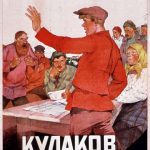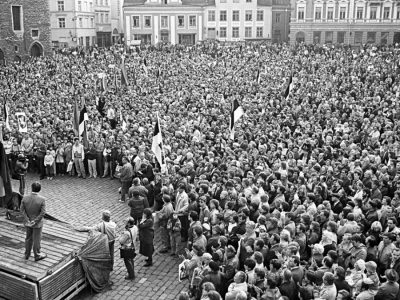According to Dictionary.com, patriotism is a “devoted love, support, and defense of one’s country; national loyalty.” Similarly, nationalism is a “devotion and loyalty to one’s own country; patriotism.” Ironically, patriotism is often seen as an admirable quality to possess because of the pride one feels for their country, whereas nationalism is often met with … Continue reading The Power of Patriotism![]()
Category: Red Star
Collectivization or ‘Dekulakization’?
by •

One of the salient features of revolutionary movements is the need to appeal to natural conservatism in the rural working … More![]()
Glory to the Mother
by •
Once the Bolsheviks came to power they gave special attention to family institutions, as well as the individual, they perceived “the patriarchal, religiously sanctioned family as tsarist society in microcosm.” Because of these thoughts, the Bolsheviks quickly gave official recognition only to civil marriages, made divorce easier, gave women full equality, rights to children born… Continue reading Glory to the Mother →![]()
Church of Gold
by •
“What can the church of gold give us? Russia could be fed this year and the next!” Source: Hoover Political Poster Database. 2007. With all of the cultural changes happening during the early 1900’s, I found the changing of religion … Continue reading →
Snatching God’s Thunderbolts
by •
In February 1920, the All-Russian Central Executive Committee of the Soviets established The State Electrification Commission (GOELRO), kicking off the first major economic overhaul under the Bolsheviks. The GOELRO sought construct thirty new power stations, reaching a total capacity of 1,000,000 kW within 10 to 15 years (up from 1,038 kW). Expanding access to electrical power was significant […]![]()
Soviet Supermen are Our Superiors
by •
The transition from revolutionaries to rulers was a huge upward battle for the Bolsheviks. Lenin and the new leaders struggled to steady the reins of a vast country in shock, torn by war, revolution, and contentious issues of … Continue reading →
The Stress of War Upon the 1917 Revolutions
by •
(Pictured above are Russian soldiers training without rifles, showing a lack of production and resources within the country during World War I) Though it was not the only cause of the 1917 Revolutions, World War I played a large role in expediting the revolutions in the years prior to them. By 1917, Russia had taken … Continue reading The Stress of War Upon the 1917 Revolutions![]()
“Let Them All Eat Cake”
by •

At the beginning of World War I, Russian officials gravely misjudged their ability to provide food during wartime and things started to decline within a year.On March 25th, the Provisional Government, after inheriting the food shortage issues, established a grain monopoly meaning that all grain was state property to be rationed as it saw fit… Continue reading “Let Them All Eat Cake” →![]()
Peace, (Love?) Bread, Land, and Worker’s Control
by •
Peace and bread (America’s favorite carb) are not words commonly associated with Russia prior to the 1917 Revolutions. At the time: “In Russia, military setbacks, food shortages, popular unrest, and a crisis of political leadership brought about the abdication of the tsar and the demise of the Romanov dynasty in February, 1917” (Virginia Tech European … Continue reading Peace, (Love?) Bread, Land, and Worker’s Control![]()
Vanguardism and the Revolution
by •
In the Communist Manifesto, Karl Marx and Friedrich Engels theorized that the inevitable progression of society would lead through a path of feudalism, capitalism, socialism, and end in communism. In 1901, fifty-three years after the publication of the Communist Manifesto, social-democrats in Russia were reflecting on the nature of a revolution to achieve the next step … Continue reading Vanguardism and the Revolution![]()
